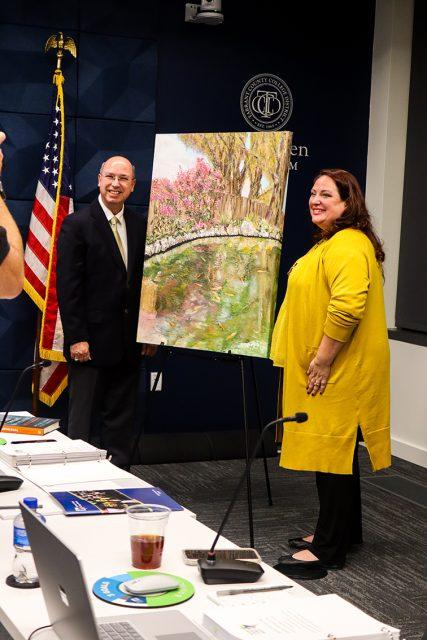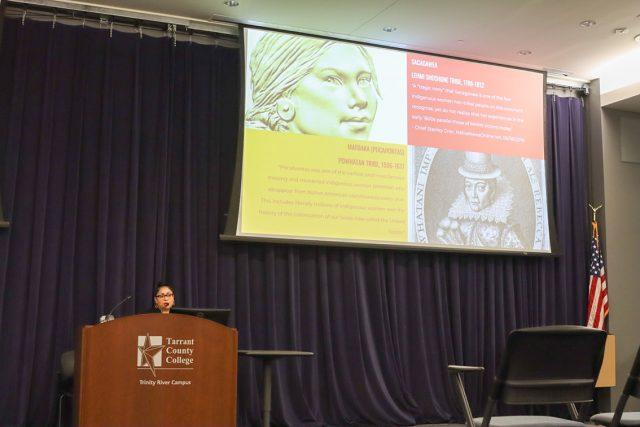KAYLEY BRADY-ESTES
reporter
collegian.editor@tccd.edu
TCC has made it possible for many nontraditional students to continue their education, but some of them say they still face challenges, particularly with financial aid.
Traditional college students are in the 18-23 age range, making up over half of the students who go to TCC. However, 23.4% of TCC students are 26 and up. Most, at this point in their lives, either live on their own, have a family or have other responsibilities outside the classroom that make their experience differ from the traditional student.
TCC alumna Susan Salazar, who is 45 and in a nursing program at Trinity Valley Community College, is working toward becoming a registered nurse. She studied through Connect Campus and said she was glad it was there when she needed it.
“I returned to school in August 2019 due to my job,” Salazar said. “I have been in the medical field for over 10 years, and my job required a few of my co-workers and me to go back. Fortunately, my job helped me register for classes, and FAFSA paid for most of my schooling because I couldn’t afford it otherwise.”
Salazar said the easiest thing about going back to school was the motivation of her co-workers. Since they were in the same boat as her, it was easier to keep moving forward even when the work-and-school balance was hard to achieve.
“The hardest thing about returning to school was learning to study again,” she said. “I had been gone since 2011 when I got my LVN [licensed vocational nurse] license. After all, I had to find what worked for me because my experience at a trade school wasn’t good. Plus, balancing school with a 6-year-old poses different challenges too.”
Going to TCC allowed Salazar to get her associate degree, a raise at work and get accepted into a nursing program. However, she said it had its set of challenges.
“While FAFSA helped me immensely, I tried to get funds to help with schooling outside of that and found it rather tricky,” she said. “I live in Terrell, Texas, and many scholarship opportunities I saw were restricted by age or county, so I couldn’t find much more help I could apply for.”
TCC helped not only her personal goals but her finances, but she wished the college had more scholarship opportunities that don’t have an age factor.
“I didn’t realize how much the scholarships appeal to a younger demographic,” she said. “There is nothing wrong with scholarships being made for traditional students. Still, I couldn’t imagine being someone who is older and can’t get financial aid that’s trying to pay for school all out of pocket and raising a family on top of that. I feel as if it can be discouraging to people who are looking to continue their education.”
Claire Key, 48, who graduated in the spring with her associate, now attends Texas Wesleyan to study business.
“I went back to school in August 2019 due to boredom and trying to separate my identity from my job and my kids,” Key said.
When her kids became adults, Key said she realized she wasn’t getting younger and expressed interest in continuing education after retirement.
“I feel traditional college students learn all these skills and different ways of thinking because of school but don’t know how to apply those skills because they don’t have experience or minimal experience in the job world,” she said.
Key said she applies what she learns to the field she has been in for 16 years. While she found a use for her skills from returning to college, she too had difficulty getting scholarships at her age.
“While you can get scholarships, I have experienced age restrictions as to what scholarships you can get,” she said. “While looking for a transfer college, I realized how much the college system only appeals to straight-out-of-high school students based on the schedules offered.”
Key said nothing about college is easy, especially for those who work full time and study full time. The enrollment process was challenging, primarily because of the gap in her college career. She also listed the challenges of finding a transfer school, the application cost to get accepted to different schools and creating a schedule that could work with her work schedule.
“School isn’t for the faint of heart,” Key said.
Connect student Michael Key Jr., the 26-year-old son of Claire Key, started school again in the fall semester to move further in his career.
“I left school at the end of 2017 due to changing jobs,” Key Jr. said. “I didn’t mean to be away from school for so long, but the time escaped me. Before the start of the fall semester, I realized that I would hit a paywall at some point in my career if I continued on my current trajectory. So I needed to continue my education to ensure that nothing limits me.”
Key Jr. said even though he is undecided on his major, he wanted to get an associate degree as it is better to have some degree than none.
“If no online school options were offered at TCC, college wouldn’t be possible, as my job is mentally draining,” he said. “Since returning to school, finding a work-life balance has been difficult. I don’t think I have yet to find my rhythm, but I know I have good people in my corner, like my mom going through the same experience, so it makes it easier.”
Key Jr. is grateful that TCC gives him an opportunity but believes changes can help nontraditional students like him.
“TCC needs to consolidate its options and offer even more flexibility to working people,” he said. “While TCC is doing so many good things, the options are overwhelming, making it harder to figure out precisely what I need to graduate. There is such a thing as too much help. When I went to the school to get advice, everyone I talked to was at different experience levels, and it was hard to get a straight answer from anyone.”































